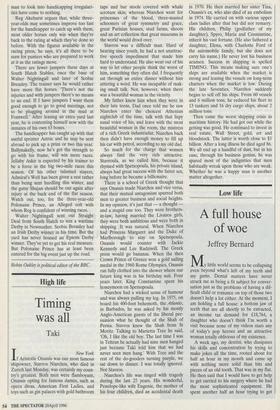High life
Timing was all
Taki
INew York f Aristotle Onassis was our most famous shipowner, Stavros Niarchos, who died in Zurich last Monday, was certainly my coun- try's greatest. Both men were flamboyant, Onassis opting for famous dames, such as opera divas, American First Ladies, and toys such as gin palaces with gold bathroom taps and bar stools covered with whale scrotum skin; whereas Niarchos went for princesses of the blood, three-masted schooners of great symmetry and grace, great Parisian houses, stud farms, shoots and an art collection that great museums in the world would drool over.
Stavros was a difficult man. Hard of hearing since youth, he had a not unattrac- tive speech impediment that made him hard to understand. He also went out of his way to let other people think the worst of him, something they often did. I frequently sat through an entire dinner without him uttering a word. He was incapable of mak- ing small talk. Not, however, when there was a beautiful woman in the vicinity.
My father knew him when they were in their late teens. Dad once told me he saw Niarchos enter the choicest Athenian nightclub of the time, talk with that lispy nasal voice of his, and leave with the most beautiful woman in the room, the mistress of a rich Greek industrialist. Niarchos back then didn't have enough money to fill up his car with petrol, according to my old dad.
So much for the charge that women always find the very rich attractive. Stavroula, as we called him, because it rhymed with Spetsopoula, his private island, always had great success with the fairer sex, long before he became a billionaire. There is a school of Greek thought that says Onassis made Niarchos and vice versa, that their mutual antagonism spurred both men to greater business and social heights. In my opinion, it's just that — a thought and a stupid one too. They were brothers- in-law, having married the Livanos girls, they were both ambitious and were both in shipping. It was natural. When Niarchos had Princess Margaret and the Duke of Marlborough to stay on Spetsopoula, Onassis would counter with Jackie Kennedy and Lee Radziwill. The Greek press would go bananas. When the then Crown Prince of Greece won a gold sailing medal in the 1960 Rome Olympics, Onassis ran fully clothed into the shower where our future king was in his birthday suit. Four years later, King Constantine spent his honeymoon on Spetsopoula.
Niarchos had a wicked sense of humour and was always pulling my leg. In 1975, on board his 400-foot behemoth, the Atlantis, in Barbados, he was asked by his mostly Anglo-American guests of the liberal per- suasion what he thought of the Shah of Persia. Stavros knew the Shah from St Moritz. Talking to Marietta Tree he said, 'Oh, I like the old boy. The last time I was in Tehran he actually had nine men hanged just because Taki told him that we had never seen men hang.' With Tree and the rest of the do-gooders turning purple, we sat down to dinner. I was totally ignored. Not Stavros.
Niarchos's life was tinged with tragedy during the last 25 years. His wonderful, Penelope-like wife Eugenie, the mother of his four children, died an accidental death in 1970. He then married her sister Tina, Onassis's ex, who also died of an embolism in 1974. He carried on with various upper class ladies after that but did not remarry. His children, Philip (godfather of my daughter), Spyro, Maria and Constantine, inherit his vast fortune. (He also fathered a daughter, Elena, with Charlotte Ford of the automobile family, but she does not carry his name.) He never lost his business acumen. Success in shipping is spelled TIMING. This means making sure one's ships are available when the market is strong and leasing the vessels on long-term charters when the market is low. During the late Seventies, Niarchos suddenly began to sell off his ships. From 60 vessels and 6 million tons, he reduced his fleet to 13 tankers and 16 dry cargo ships, about 2 million tons.
Then came the worst shipping crisis in maritime history. He had got out while the getting was good. He continued to invest in real estate, Wall Street, gold, art and bloodstock. The latter is worth close to $1 billion. After a long illness he died aged 86. We all end up a handful of dust, but in his case, through his business genius, he was spared most of the indignities that men habitually wreak upon those who are weak. Whether he was a happy man is another matter altogether.


































































 Previous page
Previous page